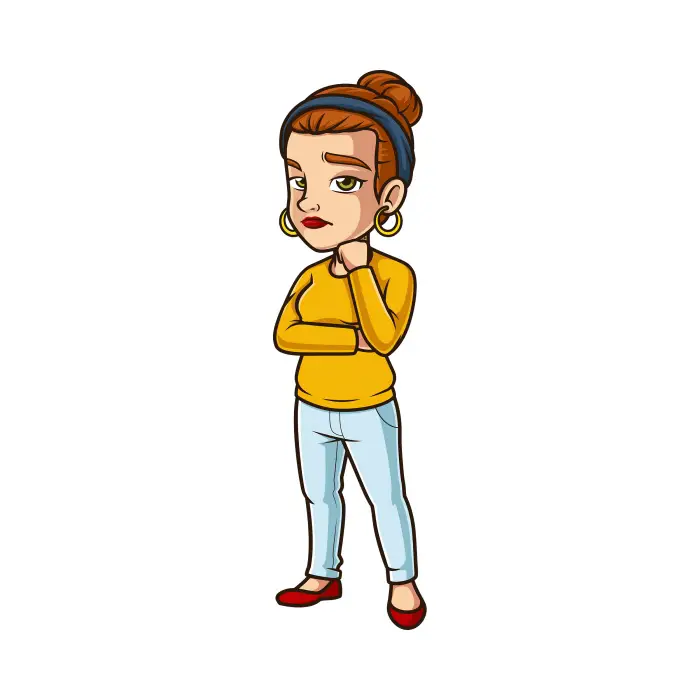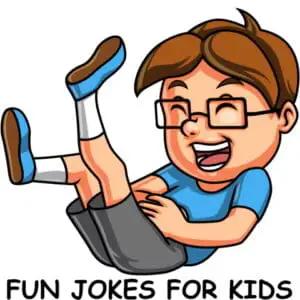Parents, or anyone around kids much, learn quickly the importance of humor. It’s there for the good times, but often is the most useful tool for the bad. And it shouldn’t be surprising to know many forms of humor/comedy exist, one being wry humor. What, if anything, should you know about wry humor and is it useful for kids?
Wry humor is both dry and witty at the same time. It often incorporates sarcasm and irony in clever ways. While wry humor is more common with adults, it’s not lost on school-aged children and above. Wry humor is more natural for some personalities but can be learned, directly or indirectly, too.

As a mom and teacher, I can’t say I’ve never used wry humor, but it isn’t the best form of humor to use with kids since it tends to be negative, unless you’re careful with it.
One way to build humor with your kids is to use it strategically through routines or regular activities. For instance, our Fun Jokes For Kids Coloring Book is a great tool for embedding humor through kid-friendly activity.
Using my unique background, I’ll share what I know about wry humor, the context it’s typically used, and some examples and suggestions for it, along the way.
Contents
Teaching Humor- Purpose
While noted psychologist Jean Piaget’s stages of child development are a natural occurrence, including understanding humor, Louis Franzini (2002) of San Diego University wrote in Kids Who Laugh: How to Develop Your Child’s Sense of Humor that it’s possible to teach humor techniques and help kids learn the various nuances of humor. It’s beneficial to their overall development to do so.
So it’s with this understanding in mind, that I approach the significance of teaching humor to kids, and the genres of it.
Benefits of Teaching Humor:
- Research says it boosts learning retention.
- It builds classroom community.
- It supports critical thinking.
- It works effectively as conflict resolution.
- It makes us laugh and smile, and that’s been proven for overall good heath. (Source: Mayo Clinic)
Whether it’s slapstick comedy or the use of irony, kids benefit when they can grasp the messages of humor and apply it properly in their own life. So let’s dive in to the topic of this particular article: wry humor.
Some Tools for Teaching Humor in the Classroom:
- Sesame Street is great for the younger crowd, particularly 6 and under. (Source: Journal of Educational Psychology)
- For older elementary and middle school kids, SpongeBob SquarePants is engaging and provides many teachable moments for satire and irony.
- And Teach Like A Pirate (free with an Audible trial) can be useful for high school humor lessons and as a former HS English teacher, I know the importance of bringing in material that works for teens!
Check out this article for more info>>Guide To Bringing Humor Into The Classroom
What is the meaning of wry humor?
It’s important to understand the meaning of wry in order to truly get what is meant by wry humor. So what is the meaning of wry humor?
Wry humor is sarcasm at its cleverest. It’s both dry and witty, not incorporating overt tactics. Wry humor is the opposite of slapstick, then, as it uses subtle methods like irony to get it’s humor across. Wry humor can come naturally to some, but it’s possible to learn to use it with practice.
As a teacher, I often utilize comparison and contrast to help students grasp meanings of challenging words. So using Merriam-Webster online, here’s a table I’ve created with the most relevant synonyms and their antonyms as they relate to ‘wry.’
| Synonyms for Wry | Antonyms for Wry |
|---|---|
| satirical | gracious |
| sardonic | calm |
| warped | honest |
| mocking | friendly |
| scoffing | nibbling |
| double-edged | comprehensible |
| droll | earnest |
And after that, I’d have students use wry and it’s synonyms in a few sentences and/or conversation.
Example 1: Wry and Satirical
- Dr. Seuss’ The Butter Battle Book is a (satirical) book about the Cold War.
- Dr. Seuss’ The Butter Battle Book is a (wry) book about the Cold War.
Example 2: Wry and Warped
- Lemony Snicket has a (warped) sense of humor.
- Lemony Snicket has a (wry) sense of humor.
Wry humor is more than smart; it’s clever. It’s a comedic way to imply, rather than simply tell a joke.
After the meaning of ‘wry’ is clearly understood, then it’s easier to ‘get’ wry sense of humor.
Because wry humor is subtle and underhanded, it requires the listener to figure it out and thus, it’s an elevated form of humor. But just because it’s intelligent, doesn’t mean it’s always appropriate to use. We’ll get into this more in subsequent sections.
I think you’ll find these related articles interesting too:
- The Lowest Form Of Humor- Puns, Sarcasm, Or Shock (Ranked)
- Best Form of Humor for Kids and Others (Mom/Teacher Told)
- Dry Humor Shows & Movies- A Parent’s Guide
Is wry the same as witty?
So does this mean that wry is the same as witty? Can we use these two words interchangeably?
While wry humor is witty in the clever sense, the two words aren’t exactly synonymous. Wit is intelligent, but also playful and quick-worded. On the other hand, wry humor pairs being witty with also being dry. Also, a person with a wry sense of humor often uses sarcasm, but a witty person does not.
Let’s look at an example for this, since as explained above, it’s a good way to explain the difference to children.
- The boy smiled wryly at the teacher when she replied, ‘Now that wasn’t so hard!’ upon turning in his homework, for he knew it had taken him all night to complete.
- The boy smiled wittily at the teacher when she replied, ‘Now that wasn’t so hard!’ upon turning in his homework, for he knew it had taken him all night to complete.
The first example shows that the boy realized his work took much longer than the teacher expected.
The second example makes it seem that the boy agreed with the teacher, even though the homework took a lot of effort from him to complete.
In this example above, wry and witty are near antonyms.
Does wry mean sarcastic?
So considering that wry and witty aren’t really synonyms, does wry mean sarcastic?
In most cases wry and sarcastic mean the same thing. Being ‘wry’ is to express oneself in an unexpected and twisted way in a dry, almost monotoned, and grim delivery that’s often taken humorously. Because sarcasm is subtle irony relying on tone and implication, it’s commonly connected to being wry.
Commonalities of ‘wry’ and ‘sarcastic’ are that both are dry; underhanded; acerbic; biting; and smart-alecky. They both rely on tone of voice too. (This is why wry humor isn’t very good to use with little kids because tone is taken at face value with them and they can’t move onto the underlying implications.)
Both wry and sarcasm are ‘smart’ forms of humor because they both rely on implications and what’s ‘not said’ to get their comedic point made. But this is precisely why this kind of humor is difficult for little kids to understand.
Dry Humor Vs. Wry Humor
Are dry humor and wry humor the same thing, then?
While wry humor is dry and witty, those words on their own aren’t ‘wry’ and can even be opposites. Wry humor is twisted and sarcastic, but generally quick. Wry humor is intelligent humor as it implies double meaning. Dry humor on the other hand relies totally on a calm delivery of funny things.
In other words, if we were creating a hierarchy of humor, wry humor would be elevated slightly above dry humor.
Dry Humor is often referred to as ‘deadpan’ humor.
Dry Humor Comedians: Rita Rudner; Rowan Atkinson; Bill Murray; and Jim Gaffigan. These comedians are generally quite funny, but delivery is very important in order to ‘get’ the comedic intention.
Impersonations is an example of dry/deadpan humor. Impersonations aren’t generally ‘funny’ on their own because they’re simply someone acting like another person, trying to be exactly like them. This means their words and actions aren’t humorous per se. The ‘funny’ or comedic part is how closely they imitate the original character.
Wry Humor Comedians: Ryan Reynolds; Daniel Tosh; Ricky Gervais; and Sarah Silverman. These comedians rely heavily on being dry, but also witty and using sarcasm.
Dry humor might be saying something funny or humorous in a dry, monotoned voice to get a laugh. But also, might say something completely normal, in a dry tone, but at the most unexpected time, which makes it funny.
Wry humor, again, is considered a bit edgier and wittier than dry humor because it incorporates implications and double-meanings in it’s humor attempt, and often relies on the ‘target’ to make the inferences necessary for the comedic appeal.
Is wry humor demoralizing?
But does this mean wry humor is negative and demoralizing, especially given its use of sarcasm?
Wry humor can be demoralizing and leans toward negativity, so it should be used carefully. As well, the use of sarcasm is often mean-spirited and easily misinterpreted. Because of this, wry humor can be problematic to use with children, even if they are capable of getting the humorous implications.
- Using Wry Humor With Toddlers: This is a no-no! Toddlers don’t have the mental capability to grasp underlying messages. Additionally, they have a hard time moving beyond the surface level of tone, so wry humor doesn’t work.
- Using Wry Humor With School-Aged Kids: It’s with caution that you use wry humor with elementary and middle-school aged children. While they have the language ability to get the humor in most cases, and can even grasp implications and irony, they struggle with the emotional factor of wry humor. Sarcasm seems mean to them and they have difficulty separating the sarcastic delivery or meaning from the intention.
- Using Wry Humor With Teens: Teens love wry humor. They enjoy sarcasm, especially dishing it out. However, even for them, sometimes the emotional factor makes wry humor a hard hurdle. As well, teens struggle with properly using wry humor, keeping it in its place and not overusing it. So again, be careful how you incorporate wry humor with this age group.
The punchline of Wry Humor
The punchline or takeway for wry humor is that it’s fine within reason.
As for when to use wry humor, it’s best with adults or with bigger kids and teens on a limited basis.
As a teacher, a wry sense of humor can be particularly helpful with connecting with older kids and teens, as it’s a subtle way to keep interest level high and maintain classroom management (keeping kids in their rightful role as students, not the teacher). It’s also a great tactic for teaching irony!
But wry humor leans heavily towards the negative, so keep that in mind, too.
To read next, I recommend these other articles about humor:
